
Pranab Mukherjee was an Indian politician who served as the 13th President of India from 2012 until 2017. In a political career spanning five decades, Mukherjee has been a senior leader in the Indian National Congress and has occupied several ministerial portfolios in the Government of India. Prior to his election as President, Mukherjee was Union Finance Minister from 2009 to 2012. He was awarded India’s highest civilian honour, the Bharat Ratna in 2019 by the President of India, Ram Nath Kovind. He passed away on August 31st, 2020 after a brain clot surgery.
Mukherjee got his break in politics in 1969 when the then-Prime Minister Indira Gandhi helped him get elected to the Rajya Sabha, the upper house of Parliament of India, on a Congress ticket. Following a meteoric rise, he became one of Gandhi’s most trusted lieutenants and a minister in her cabinet in 1973. During the controversial Internal Emergency of 1975–77, he was accused (like several other Congress leaders) of committing gross excesses. Mukherjee’s service in a number of ministerial capacities culminated in his first stint as Finance Minister of India in 1982–84. He was also the Leader of the House in the Rajya Sabha from 1980 to 1985.
Mukherjee was sidelined from the Congress during the premiership of Rajiv Gandhi (Indira Gandhi’s son). Mukherjee had viewed himself and not the inexperienced Rajiv, as the rightful successor to Indira following her assassination in 1984. Mukherjee lost out in the ensuing power struggle. He formed his own party, the Rashtriya Samajwadi Congress, which merged with the Congress in 1989 after reaching a consensus with Rajiv Gandhi. After Rajiv Gandhi’s assassination in 1991, Mukherjee’s political career revived when Prime Minister P. V. Narasimha Rao appointed him Planning Commission head in 1991 and foreign minister in 1995. Following this, as elder statesman of the Congress, Mukherjee was the principal and architect of Sonia Gandhi’s ascension to the party’s presidency in 1998.
When the Congress-led United Progressive Alliance (UPA) came into power in 2004, Mukherjee won a Lok Sabha seat (the popularly elected lower house of Parliament) seat for the first time.
From then until his resignation in 2012, Mukherjee was practically number-two in Prime Minister Manmohan Singh’s government. He held a number of key cabinet portfolios – Defence (2004–06), External Affairs (2006–09) and Finance (2009–12) – apart from heading several Groups of Ministers (GoMs) and being Leader of the House in the Lok Sabha. After securing the UPA’s nomination for the country’s presidency in July 2012, Mukherjee comfortably defeated P. A. Sangma in the race to Rashtrapati Bhavan, winning 70 percent of the electoral-college vote.
In 2017, Mukherjee decided not to run for re-election and to retire from politics after leaving the presidency due to “health complications relating to old age.” His term expired on 25 July 2017.He was succeeded as President by Ram Nath Kovind. In June 2018 Mukherjee became first former President of India to address a Rashtriya Swayamsevak Sangh (RSS) event.
Pranab Mukherjee died on 31st August 2020 at age of 85.
- Leader of the Lok Sabha : 22 May 2004 – 26 June 2012
- Deputy Chairman of the Planning Commission : 24 June 1991 – 15 May 1996
- Leader of the Rajya Sabha : January 1980 – 31 December 1984
- Member of Parliament, Lok Sabha : 10 May 2004 – 26 June 2012
- Member of Parliament, Rajya Sabha : 1 January 1969 – 1 February 2002
Personal details :
- Born : 11 December 1935 (age 84)
- Died : 31 August 2020,New Delhi, India
- Nationality : Indian
- Political party : Indian National Congress i(1969–1986; 1989–2012)
- Rashtriya Samajwadi Congress (1986–1989)
- University of Calcutta : B.A., M.A., LL.B.
- Awards : Bharat Ratna 2019
- Padma Vibhushan : 2008
Early life :
Pranab was born in a Bengali family in Mirati, a village in the Bengal Presidency of British India . His father, Kamada Kinkar Mukherjee was active in the Indian independence movement and was a member of West Bengal Legislative Council between 1952 and 1964 as a representative of the Indian National Congress and was the member of AICC. His mother was Rajlakshmi Mukherjee. He had two siblings: older sister Annapurna and younger brother Piyush.
President Pranab Mukherjee with former Prime Minister of Nepal, Madhav Nepal in Rastrapati Bhawan, India
He attended the Suri Vidyasagar College in Suri , then affiliated to University of Calcutta.He subsequently earned MA degree in Political Science & History and LL.B. degree; both from University of Calcutta
He was an upper-division Clerk in the Office of Deputy Accountant-General in Calcutta. In 1963, he became Lecturer(Assistant Professor) of Political Science at Vidyanagar College, Kolkata and he also worked as a Journalist with the Desher Dak before entering politics.
Political Career :
Mukherjee’s political career began in 1969, when he managed the successful Midnapore by-election campaign of an independent candidate, V. K. Krishna Menon. Then Prime Minister of India, Indira Gandhi, recognised Mukherjee’s talents and recruited him to her party, the Indian National Congress.He became a member of the Rajya Sabha (the upper house of Indian parliament) in July 1969. Mukherjee was re-elected to the house in 1975, 1981, 1993 and 1999.
Mukherjee became a Gandhi loyalist and was often described as his “man for all seasons.” Mukherjee’s rise was rapid in the early phase of his career and he was appointed Union Deputy Minister of Industrial Development in Indira Gandhi’s cabinet in 1973. Mukherjee was active in the Indian cabinet during the controversial Internal Emergency of 1975–77. Ruling Congress politicians of the day including Mukherjee were accused of using extra-constitutional powers to “wreck established norms and rules of governance.” Following the Congress’s defeat in the 1977 general elections, the newly formed Janata government-appointed Shah Commission indicted Mukherjee; however, the commission was itself later indicted for stepping “outside its jurisdiction” in 1979. Mukherjee emerged unscathed and rose through a series of cabinet posts to become Finance Minister from 1982 to 1984.

His term was noted for his work in improving the finances of the government that enabled Gandhi to score a political point by returning the last instalment of India’s first IMF loan. As Finance Minister, Mukherjee signed the letter appointing Manmohan Singh as Governor of the Reserve Bank of India.
Pranab Mukherjee addresses delegates of the 42nd Regional Conference of SIRC of Institute of Chartered Accountants of India.
In 1979, Mukherjee became Deputy Leader of the INC in the Rajya Sabha, and in 1980 he was appointed Leader of the House. Mukherjee was considered the top-ranking Indian cabinet minister and he presided over cabinet meetings in the absence of the Prime Minister.
Mukherjee was sidelined from the INC following the assassination of Indira Gandhi. Although Mukherjee was much more experienced in politics than Indira’s son, Rajiv Gandhi, it was Rajiv who gained control. Mukherjee lost his position in the cabinet and was sent to manage the regional West Bengal Pradesh Congress Committee. He was considered to be Indira’s likely successor and, siding with those within his party who aligned themselves against Rajiv Gandhi, Mukherjee was sidelined and eventually expelled from the mainstream.
In 1986, Mukherjee founded another party, the Rashtriya Samajwadi Congress (RSC), in West Bengal. The RSC and INC merged three years later after reaching a compromise with Rajiv Gandhi. The RSC had fared terribly in the 1987 Assembly polls in West Bengal. Many analysts, over the years, have attributed the muting of Mukherjee’s political aspirations as the supreme leader due to his inability to emerge as a magnetic mass leader.[18] On later being asked that did he ever desire to become Prime Minister, Mukherjee, however, replied, “7 RCR was never my destination.” The Zee News noted: “The statement assumes heft in the light of the longstanding speculation that Mukherjee, as one of the doyens of Congress, always nursed an ambition to occupy the top executive post.”
Mukherjee’s political career revived following Assassination of Rajiv Gandhi in 1991 when P. V. Narasimha Rao chose to appoint him as deputy chairman of the Indian planning commission and subsequently as a union cabinet minister. Mukherjee served as External Affairs Minister for the first time from 1995 to 1996 in Rao’s cabinet.
Mukherjee today is considered to be a Gandhi family loyalist and the principal architect of Sonia Gandhi’s entry into politics, a mentoring responsibility he is still believed to be shouldering. He was made General Secretary of the AICC in 1998–99 after Sonia Gandhi became Congress President. Mukherjee was made President of the West Bengal Congress in 2000 and held the position until his resignation in 2010. He had earlier held the position in 1985.
Mukherjee became Leader of the House in the Lok Sabha in 2004.He contested and won a Lok Sabha seat from Jangipur in West Bengal which he would later retain in 2009. It was speculated in 2004 that Mukherjee would be made Prime Minister of India after Sonia Gandhi declined to become Prime Minister and Manmonhan Singh was appointed.
Mukherjee was briefly considered for the post of the largely ceremonial Indian presidency in 2007 but his name was subsequently dropped after his contribution in the Union Cabinet was considered practically indispensable.
Mukherjee held many important posts in the Manmohan Singh government. He had the distinction of being the Minister for various high-profile Ministries including Defence, Finance, and External Affairs. Mukherjee also headed the Congress Parliamentary Party and the Congress Legislative Party which consists of all the Congress MPs and MLAs in the country apart from being Leader of the House in Lok Sabha and Bengal Pradesh Congress Committee President.
Mukherjee ended his affiliation with the Indian National Congress and retired from active political life following his election as President in 2012. The Economic Times had noted: “[the] decades of activity in critical all-round roles make [Mukherjee’s] exit both a structural and generation shift. With him, the last of the Congress triumvirate – along with Rao and R. Venkataraman – who formed the core team of Indira/Rajiv regimes bows out. While Rao became PM, Pranab’s political marathon too ends where Venkataraman’s did, at the Rashtrapati Bhavan.”
Pranab Mukherjee’s First Interview After Presidency
Minister of Defence :
Manmohan Singh appointed Mukherjee as the Minister of Defence of India when the Congress came to power in 2004. Mukherjee held the post until 2006. He expanded co-operation with the United States during his tenure. The Times of India reported on the Wikileaks cables release and noted how the U.S. is full of praise for the “uniformed leadership” of Indian armed forces. Mukherjee in June 2005 had inked the ten-year Indo-US Defence Framework deal.
Despite increasing co-operation with the United States, Mukherjee maintained that Russia will remain India’s ‘topmost’ defence partner. He asserted that “Russia has been and will remain India’s largest defence partner in the years to come” while inaugurating the 5th session of the Indo-Russian Inter-Governmental Commission on Military Technical Cooperation (IRIGC-MTC) in Moscow in 2005.
Russia held the first joint anti-terror war games with India in Rajasthan in October 2005, during which Mukherjee and Russian Defence Minister Sergei Ivanov narrowly escaped injury after a heavy mortar landed several metres from their platform.The Russian ministry subsequently declared its hopes to follow up joint military exercises in India with further joint exercises on Russian territory.
External Affairs Minister Pranab Mukherjee with US President George W. Bush in 2008
Minister of External Affairs
External Affairs Minister Pranab Mukherjee with Secretary Condoleezza Rice after signing the India–United States Civil Nuclear Agreement

Mukherjee was appointed the External Affairs Minister of India in 1995. Under his leadership, India was made “Full Dialogue Partner” of ASEAN as part of the Look East foreign policy initiated by Narasimha Rao. Mukherjee left the position in 1996.
Mukherjee’s second term began in 2006. He oversaw the successful signing of the U.S.-India Civil Nuclear Agreement with the US government and then with the Nuclear Suppliers Group, allowing India to participate in civilian nuclear trade in spite of not having signed the Nuclear Non-Proliferation Treaty. Mukherjee played a crucial role in mobilising world opinion against Pakistan after the 2008 Mumbai attacks. He left the position a year later to take over the Finance Ministry of India.
When asked what legacy he wanted to leave behind as Foreign Minister of India, Mukherjee replied, “As the [man] who prepared Indian diplomacy to address the challenges of a more globalised, interdependent and uncertain world.”
President of India :
Mukherjee was nominated as the presidential candidate of the United Progressive Alliance on 15 June 2012 after considerable political intrigue. The elections were scheduled to be conducted on 19 July 2012 and the results were expected to be announced on 22 July 2012. As many as 81 other candidates had filed nominations but the Election Commission rejected all except that of P. A. Sangma, the nominee of the National Democratic Alliance (NDA).To file his nomination for the presidential poll on 28 June, Mukherjee had resigned from the government on 26 June 2012.
In the election, Mukherjee received 713,763 votes, while Sangma had 315,987. In his victory speech, delivered outside his residence before the results were officially announced, he saidMukherjee was sworn-in by the Chief Justice of India on 25 July 2012, becoming the first Bengali to hold the post of President of India. After being administered the oath of office, he said we are amidist of fourth world war of terror and what minutes of peace can achieve cannot be achieved in many years of war.
Mukherjee with leaders of Russia, China, South Africa, Vietnam, and Egypt during the Moscow Victory Day Parade, 9 May 2015
Congress President Sonia Gandhi and Prime Minister Manmohan Singh both congratulated Pranab Mukherjee on his election as President.Former Communist leader Somnath Chatterjee termed Mukherjee as one of “the best parliamentarians and statesmen of India” and said the country “has got the most able man for the top job.” Opposition leader Sharad Yadav declared “the nation needed a president like Pranab Mukherjee.” Delhi Chief Minister Sheila Dikshit commented and said Mukherjee will be “one of the wisest presidents.” She further marvelled at the fact that parties in the opposition ranks supported Mukherjee. “Even the NDA broke up and wanted to vote for the president to be Pranab Mukherjee.” The Bharatiya Janata Party (BJP) was reportedly “shocked” and “upset” at the cross-voting for Mukherjee by its legislative members. However, the BJP party President Nitin Gadkari congratulated Mukherjee and said “I extend my hearty congratulations to Pranab Mukherjee on his election today as the new President of India.” Gadkari further declared “I am sure that the country will make further development and progress. I wish him all success and a bright future.”
The Zee News noted: “What is striking about [Mukherjee] is that after more than four decades in public life, the Opposition had no ammunition against him after he was declared UPA’s choice for President. In spite of Team Anna making some noise about him being involved in some corruption cases, it has been more or less an easy ride for Pranab to Raisina Hill. Once when Sonia Gandhi announced his name, most of the allies and the Opposition came on board. Whereas, NDA partner JD(U) saw no merit in opposing him, one of the bitter critics of the Congress Shiv Sena too toed the line a little too easily. This support was not for Congress but for [Mukherjee].”

Criminal Law (Amendment) Ordinance, 2013 was promulgated by Pranab Mukherjee on 3 February 2013, which provides for amendment of Indian Penal Code, Indian Evidence Act, and Code of Criminal Procedure, 1973 on laws related to sexual offences. As of July 2015, President Pranab Mukherjee has rejected 24 mercy pleas including that of Yakub Memon, Ajmal Kasab, Afzal Guru.
In January 2017, Mukherjee said he would not contest for 2017 Presidential elections. The reason he told for this was advanced age and failing health.
Personal life :
Pranab Mukherjee married Suvra Mukherjee on 13 July 1957. Suvra Mukherjee was born and raised in Narail, Bangladesh. She immigrated to Kolkata while she was 10 and married to Pranab in 1957. The couple had two sons and a daughter. Suvra died on 18 August 2015, aged 74 of heart failure while Mr.Mukherjee was still in office.
He was inspired by Deng Xiaoping and has quoted him quite frequently. His hobbies were reading, gardening and music.

His elder son, Abhijit Mukherjee, was a Congress MP from Jangipur, West Bengal until 2019. He was elected in the by-polls held after his father vacated the seat. Before his election to Lok Sabha, Abhijit was an MLA from Nalhati in Birbhum.
His daughter Sharmistha is a Kathak dancer and politician of the Indian National Congress.
Mukherjee celebrated the Durga Puja at his ancestral home in Mirati village.He used to make it a point to be at Mirati village every year to take part in the four-day rituals, the puja having a “social dimension” for him. “I want to avail this opportunity to be with the people of my area,” Mukherjee said during a puja ceremony on 4 October 2011.
Health Issues :
During the COVID-19 pandemic, on 10 August 2020, Mukherjee announced on Twitter that he had tested positive for COVID-19 prior to his surgery to remove a blood clot in his brain. He was admitted to the hospital after accidentally slipping and falling in his bathroom. He was on ventilator support and in critical condition at the Army’s Research and Referral (R&R) hospital in Delhi.
On 13 August the hospital reported that Mukherjee was in a state of deep coma after he underwent a brain surgery, however his vital parametres remained stable.On 19 August, the Army’s Research and Referral hospital said that the health condition of Mukherjee has declined as he had developed a lung infection. On 25 August, his renal parameters became “slightly deranged,” with the condition worsening days later.On 31st August, his son Abhijit Mukherjee tweeted that the former President passed away at the age of 84.
Death :
Mukherjee died on 31 August 2020, aged 84.He was suffering from COVID-19 disease and had a clot in the brain.

